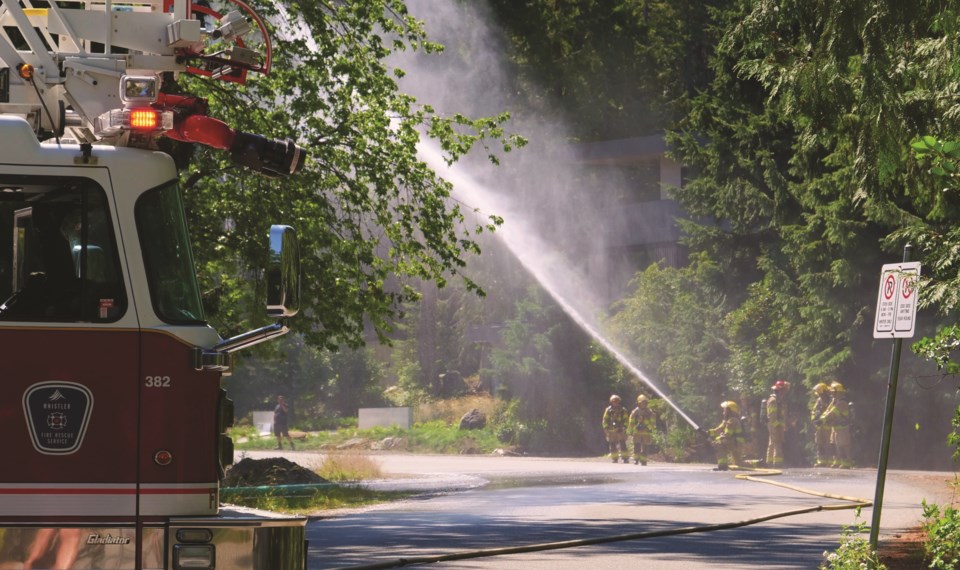The figures included in the Resort Municipality of Whistler’s (RMOW) 2020 Statement of Financial Information (SOFI) report, received by council on July 20, reflect a fiscal year that was anything but ordinary.
As the demands of the COVID-19 pandemic increased full-time staff’s workloads and decreased service levels to the public for three-quarters of the year, the RMOW’s payroll costs dipped slightly in 2020, totalling $32,925,330 compared to $33,110,798 in 2020. Its total supplier payments, meanwhile, reached $70.05 million last year, a significant dive from the more than $82.5 million the RMOW shelled out in 2019.
The closure of RMOW-run facilities like the Whistler Public Library, municipal hall and Meadow Park Sports Centre during the onslaught of the COVID-19 pandemic prompted a large layoff of casual staff in March of 2020, recalled chief administrative officer (CAO) Virginia Cullen.
“This essentially made the wage costs look like they’ve remained relatively flat,” she said.
“However, if it had been a non-COVID year, we would have likely seen an overall payroll amount increase. We expect to see payroll costs continue to rise in future years—this would be to deal with the increased workload, and now increased backlog due to COVID, but also, compared to other municipalities in B.C., the RMOW’s staffing levels are well below the median and have been for several years.”
The SOFI report details costs and expenditures for the RMOW as well as its subsidiary corporations like the Whistler Housing Authority (WHA).
Employee earnings
The municipality counted 128 employees who made over $75,000 in 2020—aside from Mayor Jack Crompton, whose total remuneration last year totalled $101,992. That’s one up from the 127 employees named on the list in 2019, and higher still than the 113 in 2018 and 105 in 2017.
Employee remuneration listed on the SOFI includes any taxable benefits, like employee contributions to the Canada Pension Plan, Employment Insurance, health benefits, vacation payout and overtime.
The RMOW’s top earner in 2020 was general manager of infrastructure services James Hallisey, who netted $176,618, up slightly from $170,664 in 2019.
That will likely change next year: Though the $153,048 CAO Cullen pulled in in 2020 is significantly less than former CAO Mike Furey’s total remuneration of $260,332, earned during his last full year in the role in 2019, the figure listed beside Cullen’s name only represents two-thirds of the year. She took over the reigns as CAO at the end of April 2020.
Furey’s name remained on the 2020 list of top earners, as he stepped into the transitional role of chief strategic policy and partnerships officer. He made $173,984 in 2020, before wrapping up his duties last summer and officially leaving the RMOW’s payroll in the fall.
Other high-earners included general manager of corporate and community services Ted Battiston ($165,856, up slightly from $163,041 in 2019), now-retired general manager of resort experience Jan Jansen ($157,570, down from $184,209), director of human resources Denise Wood ($165,714, nearly consistent with $165,318 in 2019), director of planning Mike Kirkegaard ($159,896, up from $155,065 the year prior but still down from $162,810 he made in 2018) and fire chief John McKearney, who earned $158,184 compared to $157,781.
Firefighters remained well represented on the list this year, with 22 members of the Whistler Fire Rescue Service (WFRS)—including Chief McKearney—earning more than $75,000. It’s one fewer than in 2019, when, of the 23 listed at the time, only five earned less than $100,000.
Only two WFRS members included on the 2020 SOFI report saw their earnings listed below that threshold.
Several RMOW employees saw their pay bumped up in 2020, most notably WHA general manager Marla Zucht. Her total remuneration in 2020 was $149,216, higher than the $129,909 she earned in the same role in 2019.
A rise in an employee’s earnings can often be attributable to a step increase—the RMOW operates off of a five-step compensation band, where employees typically move up a step annually—or acting pay for those who’ve taken on additional managerial responsibilities outside of their typical position.
In Zucht’s case, the raise was the result of a benchmarking exercise of her role compared to equivalent positions at other organizations, said Cullen.
“What we noted—and this is a WHA board decision—was that she was [making] below what similar roles at similar organizations were making, and so that was a level-setting of her salary,” Cullen explained.
MRDT revenue, aid funding dips
One staggering statistic found in the supplier payments list highlights just how severely the COVID-19 pandemic hit Whistler: The RMOW paid Tourism Whistler $4,231,066 in 2020, almost half of the $7,094,536 the organization received from the municipality in 2019.
The expenditure represents Tourism Whistler’s cut of the annual Municipal and Regional District Tax (MRDT) revenue—better known as the hotel tax.
Other big supplier payouts listed on the 2020 SOFI report included $8.59 million to Durfeld Log Construction Ltd. for its work on the WHA project at 1330 Cloudburst/Granite Ridge project. The company also received the RMOW’s biggest single payment the year prior, at $7.87 million.
Other significant costs in 2020 included $1.08 million to T.M. Builders Inc. for work on the Meadow Park Sports Centre’s cardio room, $6.24 million to BC Transit to help fund Whistler’s public transportation, and $1.5 million into a Lebeau Law Corporation Trust Account—that’s for the municipality’s purchase of land in Emerald that now offers the public recreational access to the Emerald Trails, including to One Duck Lake.
The RMOW also doled out $963,136 in aid payment in 2020 compared to $1,497, 896 in 2019. That funding was split amongst local organizations like Whistler Animals Galore, Tourism Whistler, the Whistler Museum, the Whistler Chamber of Commerce, the Audain Art Museum Foundation, The Whistler Museum and Archives Society, the Whistler Arts Council and the Whistler Off-Road Cycling Association last year.
The SOFI report is available for viewing in its entirety on Whistler.ca.




